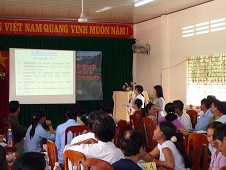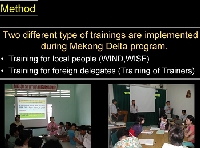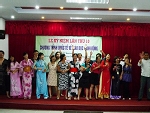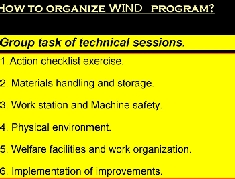![]()
What do we learn in the one week training course?
Leaning Participatory Action-Oriented Activities in the Mekong Delta

The Mekong Delta program started in 2000 based on the agreement of the Center for Occupational Health and Environment Can Tho (ECHO), the Institute for Science of Labour (ISL) and Tokyo Occupational Safety and Health Center (TOSHC).
There are 3 aims in the training course.
1: Learning from participatory action-oriented training such as WISE (Work Improvement in Small Enterprises) and WIND (Work Improvement in Neighbourhood Development),
2: Exchanging the achievements among participants
3: Applying training results into new training course of each country
The developers of the Mekong Delta Program
 Dr. Kazutaka Kogi ( The President of International Congress on Occupational Health)
Dr. Kazutaka Kogi ( The President of International Congress on Occupational Health)
Dr. Tsuyoshi Kawakami (International Labour Office, Geneva)
Dr. Ton That Khai (International Labour Office, Bangkok)
Dr. Toshio Hirano (Tokyo Occupational Safety and Health Center, Japan)
PAOT is the essential in the training course

The methodology of the training course is called Participatory Action-Oriented Training (PAOT). Two types of training programs are carried out at one time in the Mekong Delta program. One is the training for local people and the other is that for facilitators. Through the training course, local people get the knowledge of how to improve their daily lives and working conditions, and also facilitators learn how to improve their facilitation and their training skills. The training tools are consisted of action checklist and photo book of good practices which were collected from local working and living life. The training course was held 10 times every summer, the total number of participants was 286 from 14 countries. In Japan, Korea and Bangladesh, 10 participatory improvement programs were developed by practitioners and activists after the Mekong Delta international training.
How to organize WIND program?
The participants develop training presentations with group work.
On the first day, we learn PAOT methodology. It is emphasized repeatedly that showing good examples of ergonomics and occupational health which is already implemented in the local community is effective and useful.
On the second day, we experience the fieldwork in the farm fields and enterprises, and collect good examples for developing training kits through group work.
On the third day, we carry out the photo selection for making technical presentation, and doing rehearsal for the training course. The foreign participants use English for their presentation and it is translated into Vietnamese for local participants.
The next 2 days are the training for the local participants. The local participants learn health and safety and environment protection, and we learn how to be good facilitators through the training. The achievement workshop of the participants is carried out on the final day.
Cultural exchanges strengthen the teamwork of the participants from different countries.

In the Mekong Delta Training course, cultural exchanges play an important role.
At the welcome party, foreign participants wearing traditional clothes are seen dancing and singing like old friends.
Smile is very important for the success of the training course. We always keep smiling while we carry out technical presentations and performances for local people. Singing, games and dancing are useful to promote participation of the local participants.
Also local people contribute to the program by cooking local foods and performing traditional dance.
I am sure that the Mekong Delta training will be an unforgettable memory in your life.

 HOME
HOME What is the Mekongt Delta Program?
What is the Mekongt Delta Program? PAOT activities in Asia
PAOT activities in Asia

